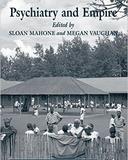Dr Sloan Mahone
I specialize in the history of psychiatry and the psychological sciences in Africa. I have extensive experience in East, Southern and Central Africa, dating back to the Peace Corps in the Democratic Republic of the Congo (then Zaire). My recent research has focussed on East Africa, particularly Kenya and Zanzibar. My current project deals extensively with photography and visual sources, particularly related to neurology and psychiatry. I also teach and supervise in the history of global psychiatry, colonialism and psychiatry, the history of photography, oral history and lived experience, the history of medicine in Africa, and the psychology of religion.
Research Interests
- History of Medicine and Psychiatry
- History of Photography
- Psychology of Religion
At present, I am completing a project on the history of psychiatry and photography in late colonial Kenya. The monograph looks at the turmoil of 1950s Kenya as told through a unique photographic collection taken by a Canadian psychiatrist who ran the mental hospital in Nairobi during the Mau Mau war. This is an unusual approach to a history of psychiatry – opting to follow the trail of a physician photographer as he encountered healers, prophets, patients, and prisoners during the most tumultuous period in Kenya’s modern history. This project has become as much a history of photography as a history of medicine with the use, re-use and misuse of the images themselves an integral part of the story. My next project, now in the planning and preliminary field site investigation stage, is a comparative history of epilepsy and neurology across Africa.
Oxford Centre for the History of Science, Medicine, and Technology
Featured Publication
Current DPhil Students
Teaching
I would like to hear from potential DPhil students regarding history of medicine in Africa, global history of psychiatry, photography and medicine, gender and sexuality.
I would like to hear from potential Masters students regarding global history of medicine, history of medicine in Africa, global history.
I currently teach:
Masters:
- Methods and Themes in the History of Medicine
- Graduate Research Forum in History of Science, Medicine & Technology
- Political Economy of Health and Medicine in Africa
- Historical Approaches to the Psychology of Religion






